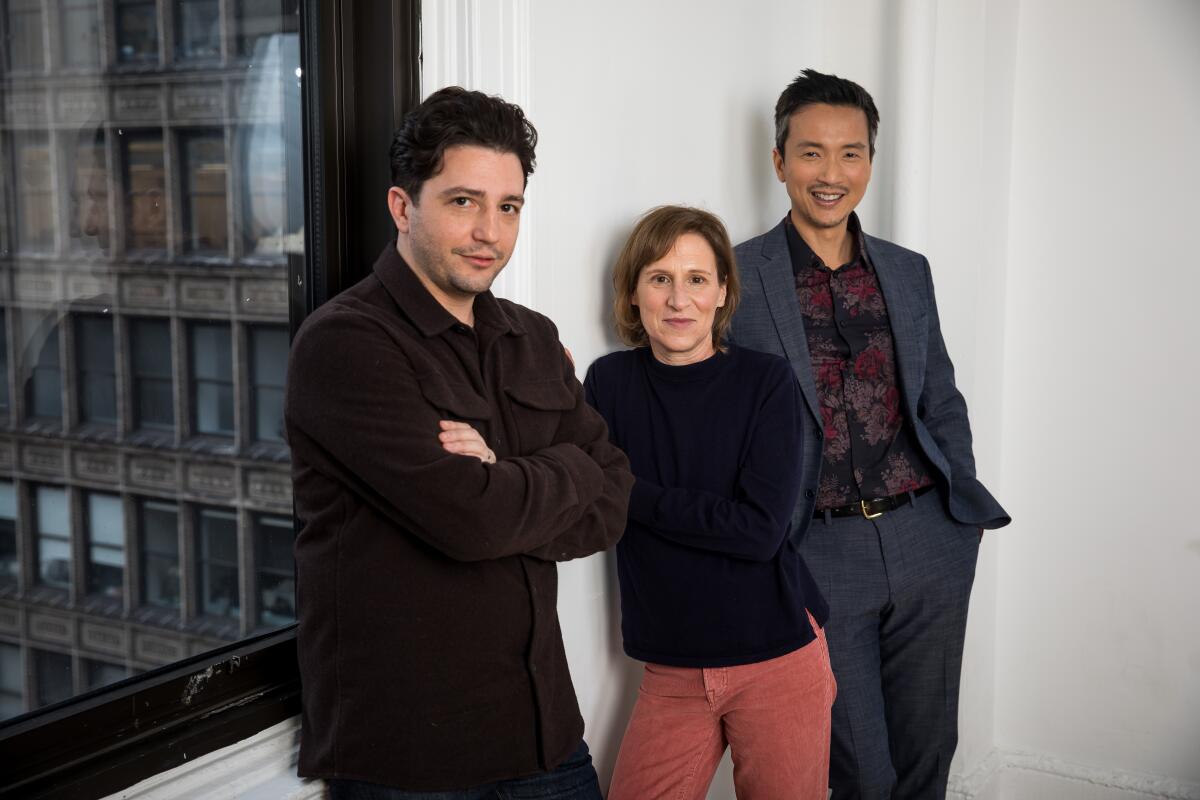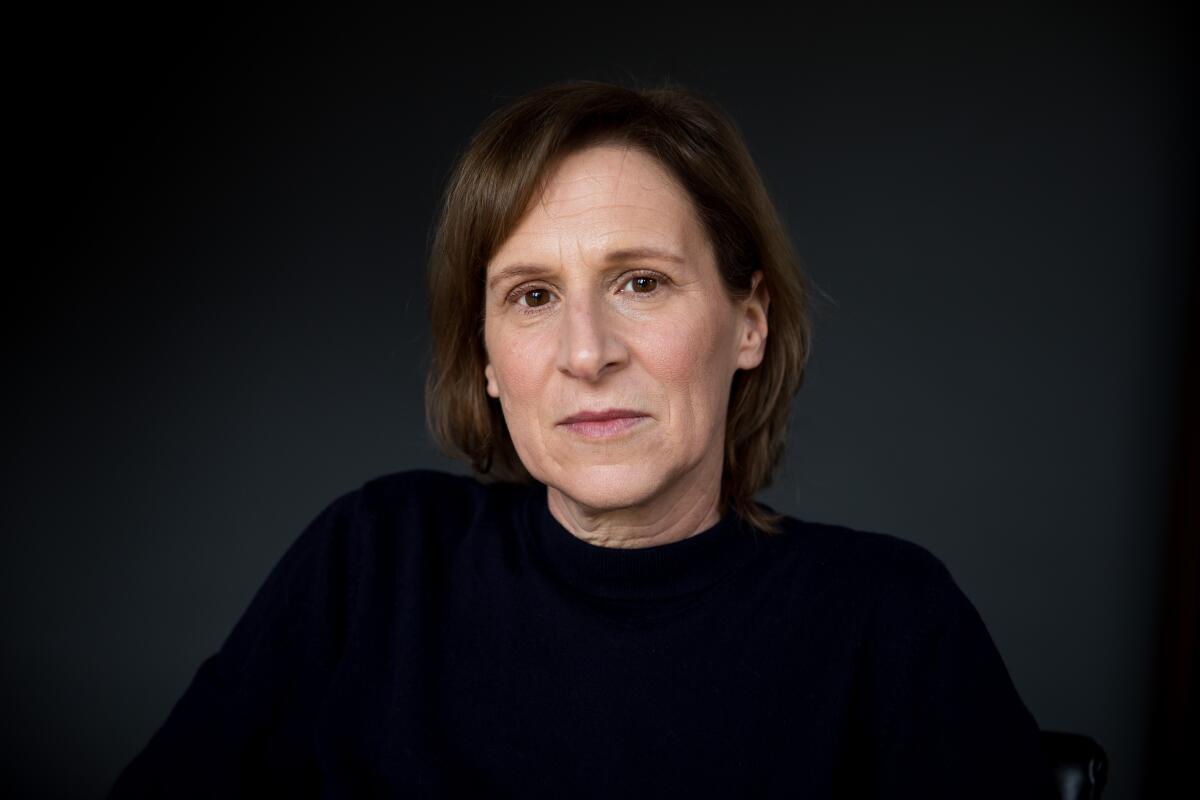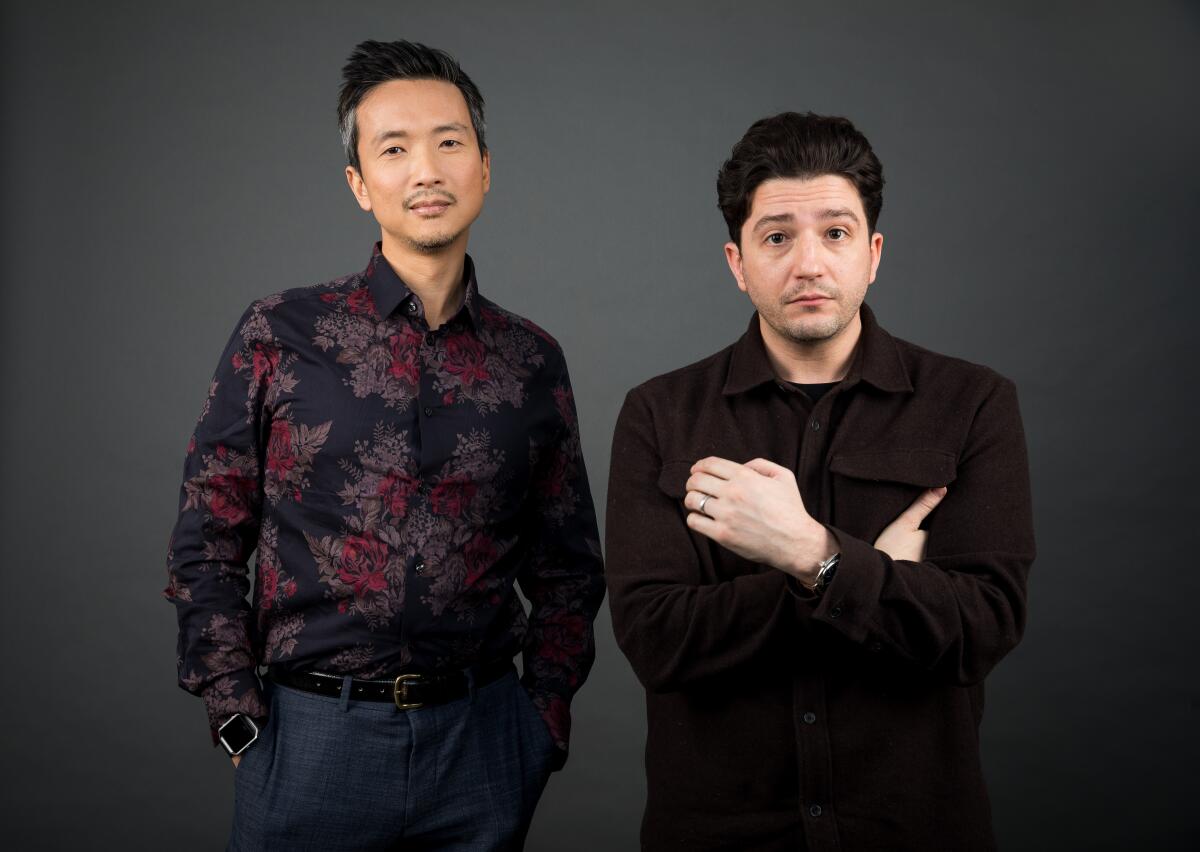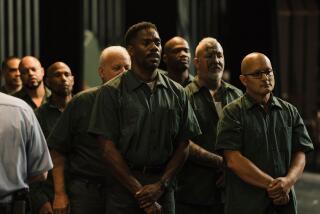How Kelly Reichardt’s ‘First Cow’ keeps the legacy of alternative westerns alive

Some things cast a long shadow. In speaking about her new movie, “First Cow,” a story of two men making the best of it in 1820s Oregon, filmmaker Kelly Reichardt reflected on not only the legacy of the western but also the iconography and ideals of masculinity that have been handed down by that most American of film genres. And how deeply audiences still respond.
“For some reason I’m thinking of ‘Once Upon a Time ... in Hollywood,’ just the visual of Brad Pitt being on the rooftop with his shirt off and the two white guys that are gonna help the damsel in distress and the white guy’s going to beat Bruce Lee and then kill the skanky hippies and then go have a drink,” Reichardt said during a recent interview in Los Angeles.
“The heroism of masculinity, white masculinity, it never dies. It just doesn’t die. Even in the face of the politics we live in, in our government, that image in filmmaking always gets a roar of applause. To me it seems so … passé. I’m just like, ‘Really? Still?’”
Based on the 2004 novel “The Half-Life” by Jonathan Raymond and adapted by Raymond and Reichardt, “First Cow” is set on the Oregon frontier. A man named Otis “Cookie” Figowitz is traveling as the cook for a group of trappers when he encounters a Chinese immigrant named King-Lu and the two strike up a friendship. Soon they launch a business together, selling fried “oily cakes” with the secret ingredient of milk surreptitiously taken from the only cow in the area.
The movie has a dry humor, and the chemistry between its stars — John Magaro (“The Big Short,” “Carol,” “Not Fade Away”) as Cookie and Orion Lee (who had small roles in “Skyfall” and “The Last Jedi”) as King-Lu — is enchanting and dynamic. Within this story of two gentle souls making their way across the harsh edges of civilization, there is something of a larger parable, an askance reimagining of the foundational myths of American virtues of ambition and self-reliance.
Into that mythology she injects two characters, intrepid in their own way, who make for a study in contrast against the more traditional mountain-man trappers to whom they sell their wares.
“To me I just thought of the tough guys as like these silly Muppets,” said Reichardt. “But getting through life, the heroic thing is if you can keep being open and have a sensitivity to what’s around you in the human level and the natural level. For someone like Cookie to survive, that’s more heroic to me.”
To prepare for “First Cow,” Magaro and Lee spent a few days in the forest with a guide to learn the skills of surviving in the wilderness, such as how to start a fire without matches, skin a squirrel and forage for berries and mushrooms.
John Magaro and Orion Lee play strangers turned friends turned business partners in Kelly Reichardt’s richly atmospheric “First Cow.”
Though they said it wasn’t much discussed — with Reichardt preferring to focus on specifics, process and tasks — both Lee and Magaro found vital connections between the story being told in the 1820s and today.
“My original thought when I first read it was two geeks meet in a violent world,” said Lee, “and they’re both sort of nonviolent. They’re both lonely people and they meet each other and they have the same sort of viewpoint and they form their friendship.”
“I absolutely loved having this opportunity to play a deconstructed alien, just a total outsider western hero,” said Magaro. “So to introduce that into this western genre, this passive, quiet, just a gentle soul, into such a broken-down and aggressive world, I think was such a brave thing for her to do. And I think that still exists in our current world that we’re going through. There is a lot of aggression, there is a lot of pressure. So to see that outsider perspective is always fascinating, and to see it in such a troubled time is even more exciting.”

Although Reichardt says she actually considers “First Cow” more of a heist film than a straightforward western, it does have direct ties to the lineage of alternative westerns — films that question the gung-ho, Manifest Destiny masculinity of both classic westerns and other contemporary films.
Actors Rene Auberjonois and Gary Farmer appear in small supporting roles in “First Cow.” It’s the final film role for Auberjonois, who died in December and also appeared in Robert Altman’s 1971 “McCabe and Mrs. Miller.” Farmer was in Jim Jarmusch’s 1995 “Dead Man.”
But Reichardt prefers not to dissect her films too deeply, granting that “First Cow” explores the idea of America’s roots as a country of immigrants and considers the question “Can capitalism work with the natural world? Can those two things coexist?”
Still, she says, the act of making a film is about “trying to create this world of being articulate and having ambiguity. And then [when it’s released] it’s like, ‘OK, go and tell everyone exactly what you were thinking.’”
Reichardt’s detailed, patient, socially aware and emotionally attuned work has made her among the most widely respected and celebrated American filmmakers of this century. Her films have premiered at prestigious festivals such as Cannes, Venice, Telluride and Sundance. And she was a member of the jury at last year’s Cannes Film Festival (where “Once Upon a Time ... in Hollywood” premiered in competition, and did not win any prizes).
She’s continued to make films completely on her own terms.
— Todd Haynes on Kelly Reichardt
Her work has been given retrospectives at institutions all around the country. She received a Guggenheim fellowship and recently won the Film Independent Bonnie Award, presented to a midcareer female filmmaker. (She spent some of the $50,000 cash grant on film stock for personal projects.) Yet her highest-grossing movie so far has been 2016’s “Certain Women,” a triptych of stories set in Montana starring Michelle Williams, Laura Dern and Kristen Stewart, which made just over $1 million at the U.S. box office.
“I don’t know anybody who more deserves the auteur mantle than Kelly Reichardt,” said filmmaker and friend Todd Haynes, credited as executive producer on Reichardt’s films from “Old Joy” through “Certain Women.” “She just probably shuns the sort of pretense of it.
“Film after film, these last six features have such a continuity of voice and discipline and aesthetic language,” Haynes said. “It’s an uncompromising result and it’s extraordinary when you step back and look at that body of work in today’s culture and market and the demands that it makes. I just think it’s an amazing feat. I think she’s continued to make films completely on her own terms.”
Still a Hollywood outsider, Reichardt splits her time between New York, where she teaches at Bard College, and Portland, Ore. It was in Portland where she was first introduced to Raymond by their mutual friend Haynes. Raymond and Reichardt first met while he was writing “The Half-Life” and the enthusiasm two young women in that book profess for actor Warren Oates comes from a recollection of what Raymond described as a “Warren Oates tribute talk” that Reichardt delivered at a party.
When Reichardt first read the book she immediately wanted to adapt it, but knew its sprawling, expansive story, covering multiple centuries — and a section in 1800s China — would require a scale beyond her reach. She eventually asked Raymond if he had any short stories she could adapt, and they collaborated on 2006’s “Old Joy.” They have since also worked together on “Wendy and Lucy,” “Meek’s Cutoff” and “Night Moves.” (“Certain Women” was adapted by Reichardt from short stories by Maile Meloy.)
“First Cow” is an unusual adaptation considering what a thin sliver of the book it is based around. The character of King-Lu in the movie actually combines that character from the book with another. And the book has no cow.
“It feels like a new thing. It feels like a different creature that was kind of grafted from just a cutting of the old one,” Raymond said of the relationship between the book and the film. “The whole process has been really enchanted, and it felt like it did end up retaining the spirit of the book, thematically and sort of vibrationally. But in just a totally different form. It was a very interesting experiment in rehabilitating something.”

For “First Cow,” Reichardt worked with her longtime producers Neil Kopp and Anish Savjani, but also for the first time with producers Scott Rudin and Eli Bush, who are behind such recent films as “Uncut Gems” and “Lady Bird.” (“First Cow” is also Reichardt’s first film to be distributed by A24.)
Among other firsts on the film, “First Cow” was Reichardt’s first production with a union crew, which meant shorter hours and work weeks. The temperatures outside were relatively mild compared to the extreme cold of “Certain Women” in Montana and the extreme heat of “Meek’s Cutoff” in Oregon, and shooting just outside Portland meant Reichardt was able to sleep in her own bed at night. Even little changes like not driving to set each day with producers Kopp and Savjani, so she didn’t hear the particulars of their production issues, allowed her to approach her work with a clearer head.
“I felt really invigorated making this film,” Reichardt said. “You know, a lot of our films have been about depletion and loneliness and despair. And this was a film that was largely about friendship. It was super challenging, but it was really special. I felt lucky the whole time, put it that way.”
Reichardt’s first film, “River of Grass,” came out in 1994; it was a long stretch of years until her second feature, “Old Joy” in 2006. And though she has worked steadily since then, balancing her own feature films with her position at Bard — “Don’t we all really just plan our lives around health insurance?” she said sensibly — those years seem to have left a lasting impression on her attitude toward conventional success and the mainstream movie industry.
“In the beginning, there was no getting into that other world because it’s so many gatekeepers in the indie film world in the ’90s, just a boys club,” she said. “But then I came to realize it just wasn’t necessarily a gate I wanted to break into. Just out of necessity, I built this other world of people to make films with, and it has ended up just having its own life.
“I was working outside the system ’cause I couldn’t get into the system. But in fact I like going off and I like editing my own films and I like telling small stories where you can really get into the minutiae of stuff,” she said. “Hollywood’s never been that appealing a world to me. It’s just not my thing. I, just as a dummy, thought that was the only way to make films. But it’s not.”
More to Read
Only good movies
Get the Indie Focus newsletter, Mark Olsen's weekly guide to the world of cinema.
You may occasionally receive promotional content from the Los Angeles Times.











